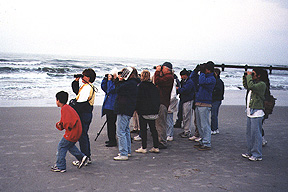Cornell's Spring Field Ornithology course teaches birding during peak migration time
By Roger Segelken

As the southernmost birds prepare for their annual journey north, Cornell University ornithologist Stephen W. Kress is readying his lecture notes, pictures and bird calls for the 23rd annual presentation of the popular Spring Field Ornithology course, offered this year from March 29 through May 20 at the Cornell Laboratory of Ornithology.
The eight-week, noncredit course teaches beginning-level bird watchers -- as well as more experienced birders who want to sharpen their skills -- about identification, natural history and behavior of birds in the Cayuga Lake region in the springtime. (The class also is open to Cornell students as a for-credit, independent study course with a Feb. 10 enrollment deadline.)
Wednesday evening lectures are given by Kress, who is a National Audubon Society biologist stationed in Ithaca and a senior research associate of the Cornell Laboratory of Ornithology, and by other members of the laboratory staff. Optional Saturday field trips are led by Kress and a flock of experienced birders to a variety of habitats in the region.
Enrollment fees for the course are $195 for lectures and field trips or $105 for lectures only or field trips only, with a discount for members of the Laboratory of Ornithology. To enroll or for more information, call (607) 254-2440 or visit the laboratory web site http://birds.cornell.edu/sfo/
"There's no better time than spring in the Finger Lakes to see an enormous variety of birds," says Kress. "Many of the most fascinating migrants in the hemisphere are passing through, following this natural flyway to their summer breeding grounds farther north. Birds that will spend the summer here are also arriving, choosing their nest sites and pairing up. It's quite a show, if you know what to look for!"
Besides teaching one of Cornell's longest-running courses, Kress is known for leading Project Puffin in the reintroduction of Fratercula arctica to their former habitats off the coast of Maine. Reintroduction methods developed for the puffins have been adapted for conservation of other threatened species around the world. The researcher and teacher is the author, co-author or editor of a number of books, including Bird Gardens: Welcoming Wild Birds to Your Yard, Audubon Society Handbook for Birds, Bird Life: A Guide to the Behavior and Biology of Birds, as well as the children's book Project Puffin: How We Brought Puffins Back to Egg Rock.
Media Contact
Get Cornell news delivered right to your inbox.
Subscribe